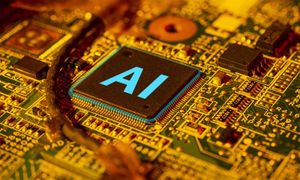Financial News
San Francisco’s ‘Hack for Social Impact’ Unleashes AI for Homelessness and Justice

San Francisco's tech community is once again rallying its formidable expertise for a cause greater than profit, as the 'Hack for Social Impact' hackathon prepares for its 2025 iteration, building on the profound success of its inaugural event last year. Scheduled for November 8-9, 2025, just days from now, this innovative gathering brings together top engineers and AI talent to develop groundbreaking artificial intelligence solutions for critical social challenges: combating homelessness and accelerating justice for the wrongfully convicted. This initiative underscores a growing movement within the tech industry to channel advanced AI capabilities directly into public service, demonstrating how machine learning and large language models can be powerful tools for tangible social change.
The hackathon serves as a vital bridge between cutting-edge technology and the urgent needs of non-profit organizations, which often lack the resources to harness the latest AI advancements. By focusing on specific, real-world problems presented by partner non-profits, participants are tasked with creating viable, impactful solutions that can be implemented to improve lives. The event not only fosters innovation but also cultivates a sense of collective responsibility within the tech sector, proving that the same technologies driving economic growth can also be leveraged to address some of society's most intractable issues.
AI's Precision Strike Against Social Injustice
The 'Hack for Social Impact' hackathon leverages the transformative power of generative AI and large language models (LLMs) to tackle complex societal problems with unprecedented precision. The inaugural event on November 9-10, 2024, at Digital Garage US, saw over 150 participants lay the groundwork for solutions that are now poised for further development in the upcoming 2025 hackathon.
For homelessness, the focus has been on streamlining processes that often exacerbate the crisis. One significant project from the 2024 event, Comply.ai (now bild.ai), a second-place winner, developed an AI-powered tool for automated architectural plan review for building code compliance. This innovation directly addresses the complexity and cost associated with developing affordable housing by systematically analyzing and comparing building codes across jurisdictions, a challenge presented by UC Berkeley's Terner Center for Housing Innovation. The upcoming 2025 hackathon aims to further this by developing a unified fundraising hub for Project Homeless Connect to address critical funding gaps and design trauma-informed AI intake tools for the California Homeless Youth Project, allowing young people to articulate their needs once and access care more swiftly. These AI applications differ significantly from previous manual or less sophisticated digital approaches by offering rapid, data-driven analysis and personalized interaction, thereby reducing bureaucratic hurdles and increasing efficiency.
In the realm of justice, particularly for wrongful convictions, AI offers a beacon of hope. While the 2024 event included projects like the Tenant Case Navigator—a third-place winner that created a searchable database with AI-driven insights for tenant rights advocates in partnership with Community Legal Services in East Palo Alto (CLSEPA)—the 2025 hackathon explicitly targets wrongful convictions. A planned project in partnership with The Innocence Center aims to utilize AI to automate structured case files. This is a critical advancement, as the manual review of extensive legal documents and evidence is a time-consuming bottleneck in the exoneration process. By automating this, AI can significantly accelerate the identification of key discrepancies and evidence, potentially freeing innocent individuals much faster than traditional methods. The initial reactions from the AI research community and legal experts highlight the immense potential of these tools to democratize access to justice and streamline legal aid processes, marking a significant departure from labor-intensive human review.
Reshaping Corporate Responsibility and AI Innovation
The 'Hack for Social Impact' hackathon profoundly impacts AI companies, tech giants, and startups by setting a new benchmark for corporate social responsibility and fostering innovation in the "AI for Good" sector. Companies like Google (NASDAQ: GOOGL), a sponsor for the 2025 event, are increasingly recognizing the strategic advantages of aligning their technological prowess with societal needs. This development encourages major AI labs to dedicate resources not just to commercial applications but also to philanthropic endeavors, potentially leading to the establishment of more specialized "AI for Good" divisions or grants.
For startups, the hackathon acts as a powerful incubator. Projects like Comply.ai (now bild.ai) demonstrate a clear pathway from hackathon idea to viable product with social impact. This can inspire a new generation of entrepreneurs to build companies explicitly focused on solving social problems using AI, attracting impact investors and creating a new market segment. The competitive implications for major AI labs are significant; demonstrating a commitment to social impact can enhance public perception, attract top talent driven by purpose, and potentially open doors to government and non-profit partnerships. Furthermore, the solutions developed, such as automated building code analysis or legal document processing, could disrupt existing service models by offering more efficient and cost-effective alternatives, pushing traditional service providers to integrate AI or risk becoming obsolete. This market positioning not only offers strategic advantages in terms of brand reputation but also in developing novel AI applications that might have broader commercial utility in the future.
AI for Good: A New Frontier in Societal Impact
The 'Hack for Social Impact' hackathon fits squarely into the broader AI landscape as a powerful testament to the growing "AI for Good" movement. This initiative underscores a significant trend where the ethical application of AI is moving from theoretical discussions to practical, implementable solutions. It highlights a shift in focus from purely profit-driven AI development to models that prioritize societal welfare, addressing urgent global challenges like poverty, health, and justice.
The impacts are potentially far-reaching. By developing AI tools that streamline housing development, enhance legal aid, and accelerate the exoneration of the wrongfully convicted, the hackathon directly contributes to reducing suffering and fostering a more equitable society. However, like all powerful technologies, AI for social impact also presents potential concerns. Issues such as data privacy for vulnerable populations, the potential for algorithmic bias in legal or social service applications, and the need for robust oversight mechanisms remain critical. Comparisons to previous AI milestones, such as early successes in medical diagnosis or scientific research, suggest that these social impact applications could mark a similar turning point, demonstrating AI's capacity to deliver profound human benefits beyond commercial gains. The hackathon serves as a crucial proving ground for these ethical AI applications, pushing the boundaries of what AI can achieve when guided by a humanitarian mission.
The Road Ahead: Scaling Solutions and Addressing Challenges
Looking ahead, the 'Hack for Social Impact' hackathon promises to be a catalyst for sustained innovation in AI for social good. Expected near-term developments from the upcoming November 2025 event include refined prototypes and potentially pilot programs for the unified fundraising hub for Project Homeless Connect and the trauma-informed AI intake tools for the California Homeless Youth Project. For The Innocence Center, the AI-driven automation of structured case files could move closer to real-world deployment, significantly impacting the rate of exonerations.
Long-term developments will likely focus on scaling these solutions beyond San Francisco, adapting them for use in diverse communities and legal systems. Potential applications on the horizon include predictive analytics for identifying areas at high risk for homelessness, AI-powered legal research tools for public defenders, and intelligent systems for connecting individuals with social services based on their specific needs. However, significant challenges need to be addressed. These include securing ongoing funding for maintenance and development, ensuring the ethical deployment of AI to avoid exacerbating existing inequalities, and building trust among the communities these technologies aim to serve. Experts predict a future where AI becomes an indispensable tool in the social sector, but only if these challenges are met with careful consideration and collaborative effort. The success of these hackathon projects will largely depend on their ability to integrate seamlessly into existing non-profit workflows and demonstrate measurable positive outcomes.
A Watershed Moment for AI with a Conscience
The 'Hack for Social Impact' hackathon represents a watershed moment in the narrative of artificial intelligence, underscoring its profound potential as a force for good. The key takeaway is clear: when directed with purpose and collaboration, AI can transcend its commercial applications to tackle some of humanity's most pressing challenges. From streamlining affordable housing development to accelerating justice for the wrongfully convicted, the solutions emerging from this initiative demonstrate AI's capacity to deliver tangible, life-altering benefits.
This development's significance in AI history lies in its powerful demonstration of ethical AI in action, moving beyond theoretical discussions to practical, implementable projects. It solidifies the "AI for Good" movement as a vital and growing segment of the tech industry, challenging companies and developers to consider the broader societal implications of their work. The long-term impact could be transformative, fostering a more compassionate and equitable application of advanced technology. In the coming weeks and months, the tech world will be watching closely to see how the projects from the 2025 hackathon evolve, how they are implemented by partner non-profits, and what further innovations they inspire. This initiative is a powerful reminder that the future of AI is not just about what it can do, but what it can do for us.
This content is intended for informational purposes only and represents analysis of current AI developments.
TokenRing AI delivers enterprise-grade solutions for multi-agent AI workflow orchestration, AI-powered development tools, and seamless remote collaboration platforms.
For more information, visit https://www.tokenring.ai/.
More News
View More




Recent Quotes
View More
Quotes delayed at least 20 minutes.
By accessing this page, you agree to the Privacy Policy and Terms Of Service.



